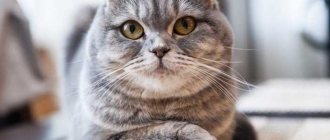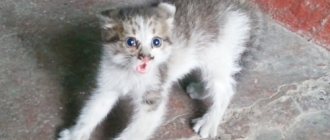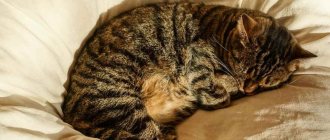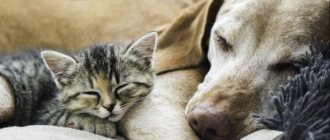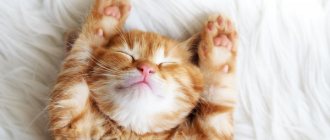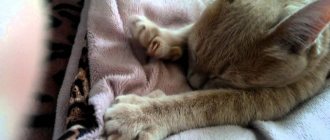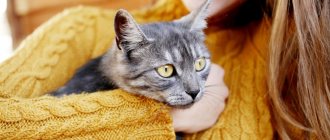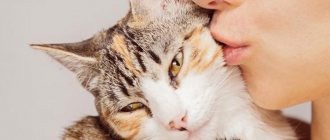Most owners believe that their mustachioed friend is a full member of the family. In this regard, the desire of the owner and the cat to spend as much time as possible together is understandable - even during rest. There is still no consensus on why pets like to sleep in public, but there are many interesting assumptions.
Content
1. Why do cats lie on humans?
– Scientific hypotheses
– Observations from the owners
– A bit of the supernatural
2. Is it true that cats lie on a sore spot and heal it?
3. Does it matter what parts of the human body a cat lays on?
4. Is it possible for a cat and a person to sleep in the same bed?
- Arguments for
- Arguments against
– Precautions
Why do cats lie on humans?
Representatives of the cat family have lived among people for thousands of years, but it is still difficult to understand them. No one can explain exactly why pets love to sleep in the company of their owners, choosing a person’s head, stomach or back as a bed. There are only different theories and assumptions on this matter.
Scientific hypotheses
Among zoological scientists, a large group consists of those who study the causes of animal behavior in various situations. Experts who observe their habits give different explanations for the fact that the cat is lying on a person. The most logical ones are the following:
- The pet uses the person as a heating pad. Indeed, cats have a normal body temperature that is 2 degrees higher than that of humans. This makes it harder for them to stay warm. A person is the warmest place to sleep compared to other “interior items”.
- By placing itself on top, the cat shows its superiority. Representatives of the cat family have historically been predators. In this regard, even domesticated animals want to feel like leaders in a pack. Lying on top, the fluffy one controls the territory of the house and its inhabitants.
- The pet wants to feel safe. Positioned on a person, it seeks to relax and find protection.
- The mustache is attracted to the smell emanating from the owner. Scientists have suggested that human sweat is a kind of aphrodisiac for furry cats. This is why some cats fall asleep with their nose buried in people's armpits.
- Calms the heartbeat of a kitten or adult. Lying on top of their chest, they fall asleep to the hypnotic rhythm. Little kittens want to sit on a person to remember and feel their mother’s heartbeat.
Despite the fact that no hypothesis is 100% proven, the explanations seem logical. You can observe your mustachioed friend yourself and confirm the scientists’ guesses.
Owner's observations
Many breeders believe that pet fluffies love to sleep on a person simply because it is comfortable. Others talk about the affection and love of a mustachioed friend for a person. But the most attentive people have long noticed a certain pattern in the desire to lie on a person - they call the reason for this desire a lack of communication and attention. The animal purrs and lies down next to or on a person because it needs close contact.
It has been noticed that the longer a pet is left alone, the more stress it experiences. By laying down on a person, the mustache tries to compensate for the time it spent without communication.
On the other hand, by its behavior the pet shows a desire to alleviate suffering. Owners often talk about the cat’s desire to lie on the part that hurts or aches. Placed on the back, chest or legs, the fluffies begin to purr and massage the problem area with their paws. Thanks to this, the discomfort experienced by the owner is reduced.
In addition, furry homebodies have a desire to protect a loved one. Like dogs, felines have a bold character and strive to dominate. Therefore, if a cat lies on a person, then he is not just dozing, but protects the house and the people living in it.
A bit of the supernatural
Since ancient times, people have been talking about the supernatural abilities of mustachioed pets. It has been noted that it is the mustaches that find out about the mistress’s pregnancy before anyone else. They take protection of the unborn child and the expectant mother, positioning themselves on her stomach.
It is believed that the powerful energy of pets has a positive effect on weather-sensitive people. Thus, a cat can normalize the owner’s blood pressure or eliminate a migraine if it lies on top of its head.
Many believe that pets have extrasensory abilities, sense negative changes in the human biofield and strive to neutralize their negative effects. Lying in the area of the solar plexus, murkies thereby improve the owner’s mood, relieve stress, relieve depression and seasonal blues.
Beliefs attribute the greatest supernatural and healing powers to white cats. Black representatives are endowed by popular rumor with the ability to take away negative energy. Saffron milk caps are considered an excellent source of strength - they are ready to convey to a person their positivity, cheerfulness and good mood. Gray fluffies, on the contrary, give peace and tranquility.
Why cats love their owners
We should not overestimate our smaller brothers. They are smarter than we might think. Cats perfectly feel the love of their owner, instinctively predicting a bad attitude towards them. Sometimes it seems that they know human language and understand what people are talking about.
It’s not for us to judge why cats love their owners. Perhaps these creatures are smarter than us. In addition, some believe that they can communicate with spirits and are guides to the other world. In connection with this, a plausible explanation for why a cat loves its mistress or owner may be the fact that the animal has been possessed by the soul of a deceased loved one. Therefore, you should not kick a stray kitten out of the house. There is a possibility that a loved one who has passed away forever wants to communicate with you.
However, if we discard all mystical assumptions, we can note the reasons why the cat loves the owner’s husband, and the cat loves her. In this case, the male is attracted to the female smell of sweat, and the female is attracted to the male. Despite this, all cats feel the love of their owners, regardless of gender.
Is it true that cats lie on a sore spot and heal it?
Conducted scientific research and experiments have repeatedly proven the ability of adult representatives of the cat family to heal. The special energy transmitted by animals has a positive effect on human health. There is even such a treatment method in medicine. It has different names: pet therapy, animal therapy or zootherapy. Specifically, cat healing is called feline therapy.
Even official medical institutions around the world use feline therapy. Fluffy “doctors” can lower blood pressure. In clinics and rehabilitation centers in the UK, they help patients after injuries, patients with autism or cerebral palsy.
The pet tries to place itself in the place where the person has unpleasant sensations. Many people note that after the pet lies down on the suffering part of the body, the pain goes away or is significantly reduced. The mustache relieves pain thanks to the warmth and positive energy emanating from it. Massaging the aching joint or muscle with your paws also brings relief to the sufferer.
It has been proven that fluffies emit biocurrents that are created due to the friction of fur hairs. Microcurrents have a beneficial effect on sore joints or injured muscles. For women suffering from inflammation of the appendages or menstrual pain, the influence of such energy is recommended. The furry doctor is placed on the lower abdomen for half an hour. After this, significant relief comes.
The vibration from purring also has healing powers - research is still being conducted on this matter. But there are already versions that cats purr precisely at those frequencies that relieve pain and spasms.
The emotional background created by furry couch potatoes has a beneficial effect on an upset and sick person. The feeling of warmth and calm transmitted from a cat sleeping next to you relaxes and creates a positive mood.
Older people who own a pet are believed to live longer and stay active longer. This is not surprising: caring for a cat is not difficult, and the pleasure from communicating with her is always abundant.
What kind of people do cats like?
The answer to the question of what kind of people cats love lies in the psychology of these animals, namely, in the peculiarities of their lifestyle and preferences. Cats love comfort and warmth, they can bask in the sun for hours and sleep up to 20 hours a day, and also spend a lot of time taking care of themselves - licking their fur and paws, “washing themselves,” etc. Most of the time cats behave independently , leisurely and measured, and only sometimes they want to run, jump, sharpen their claws and chase each other or live or toy mice. Therefore, representatives of the cat family love people whose habits resemble them. And vice versa, cats treat with distrust and wariness those people who are very different in behavior from purrs - they fuss, make a lot of sudden movements, are in constant tension, etc.
Animal psychologists, observing cats and their owners, have found that cats show love and affection for people who seem understandable to them and at the same time do not pose a danger to them. And cats determine this very degree of similarity and human safety by the following criteria:
- Voice. Cats are attracted to people with a pleasant timbre of voice, who speak calmly, slowly and with soft intonations. And since nature has endowed women with a more gentle and pleasant-to-hear voice, it is not surprising that cats often love the fair sex more than men. However, a cat may well get used to a man’s voice and fall in love with its owner if he does not scream, hiss and make other sounds that are frightening and unpleasant for the animal in her presence.
Movements. Cats like people who move slowly and leisurely much more than fussy and impetuous individuals, since these animals can perceive sharp swings of their arms, a swift gait and any impetuous movements as a potential threat to themselves.- Smell. Everyone knows about the ability of dogs to distinguish many odors, but few people know that cats also have a very sensitive sense of smell and, not least of all, evaluate new acquaintances by smell. As a rule, felines do not like people who smell like dogs, other cats, alcohol, vinegar, or too strong perfume.
- Attitude towards the cat. Surely many cat owners have noticed that their furry purrs show much more sympathy for those guests who are indifferent to them, but they avoid people who immediately try to pick up or stroke the animal. The explanation for this love of cats for those who do not pay special attention to them is simple: cats, being independent animals, value their personal space and really do not like annoying pesters. The animal will most likely hide from a person trying to stroke and cuddle an unfamiliar cat at the first opportunity. However, natural curiosity is also inherent in cats, so sooner or later they will want to get to know and study a person who is next to them, but who is not paying attention to them.
Of all the family members , the cat will most likely choose the calmest person as his owner and pet, who feeds and cares for the animal, but at the same time does not impose his love on him - does not try to constantly squeeze and stroke him, does not bother him during sleep and rest, etc. And vice versa, cats are often indifferent to children and do not like to play with children too much, since these independent animals do not like to be carried for a long time in their arms, squeezed, dragged by the tail, and even more so, dressed up like a doll.
Does it matter what parts of the human body a cat lays on?
Trying to fit more comfortably on the owner’s body, the cat does not always care about its comfort, but worries about the human’s health and tries to point out the problem. In the old days, it was believed that a mustachioed friend would lay down precisely on the part where there was already painful sensations or where pain would soon appear.
Indeed, there are patterns in why a pet is located in a certain place:
- When the fluffy lays down on his feet, it’s worth thinking about the health of his joints or veins. If there are no problems with the limbs, then the mustachioed doctor is simply trying to relieve the fatigue and tension that has accumulated during the working day.
- If a cat lies down on a person, choosing its head as a “bed,” this may indicate the owner’s weather sensitivity. The pet seeks to alleviate a person’s condition, relieve headaches, influence high blood pressure, and relieve tension.
- If your pet stomps and then lies down on its chest, this may be a signal of problems with the cardiovascular system. By choosing the left side of the chest as a bed, the mustache tries to alleviate suffering, relieve tension and normalize the heartbeat.
We must remember that the cat most often chooses one family member as a sleep partner, whom he cares for and protects. Therefore, observing the behavioral characteristics of a fluffy and his desire to lie on another person gives another reason to think about his state of health.
Is it possible for a cat and a person to sleep in the same bed?
It is assumed that if a cat lays on a person, then it is its person. Many people completely agree with this statement. The owner must provide the fluffy with a balanced diet and comfortable living conditions. For this purpose, houses, baskets with soft mattresses, and beds are purchased. There are even special heated mats that caring family members buy. However, for a furry couch potato, there is nothing better than the bed of a loved one.
Arguments for
There is an opinion that the mustachioed pet and its owner are very similar. Moreover, we are talking not so much about external similarity as about the inner world. Therefore, two close beings strive to spend more time together, including in sleep.
When a cat is placed on a beloved family member, it takes on some of the stress. Problems and anxieties fade into the background when a person strokes a pet and hears its rumbling. And the most important argument is that sleeping together gives a feeling of comfort and pleasant emotions.
An invisible connection arises between a person and a furry homebody, which allows you to enjoy communication not only during the day, but also at night. Close beings usually have difficulty withstanding separation from each other, so sleeping alone is not acceptable to them.
Arguments against
Experienced breeders, zoologists and veterinarians are not supporters of keeping a mustachioed friend on a bed or on a person. Many felinologists declare the inadmissibility of joint recreation. The following reasons are put forward as arguments:
- Animals are carriers of infectious diseases.
- Dirt from paws leads to rapid soiling of bed linen.
- If a cat suddenly gets sick, then he needs a bed isolated from humans and other inhabitants of the house.
- A kitten that climbs onto the bed in search of warmth may be injured. There is a high risk of crushing the baby.
- Even the friendliest mustache sleeping next to a child can accidentally scratch him.
- During periods of heavy shedding, an animal's fur can cause allergies or simply discomfort in the person sleeping next to it.
In order to get a good night's sleep, a person needs to create comfortable conditions around him. A pet that tries to settle comfortably on the owner’s body is unlikely to contribute to this. To ensure that both family members get a good night's sleep, you should think about purchasing a separate, comfortable bed for your wayward mustache.
The best option that will suit both the owner and the animal is to arrange a separate corner on the bed for the pet. You can arrange a bed for him on the side - or place a covered chair or armchair next to the bed, on which the cat will happily rest.
Precautions
To ensure that sleeping on the same bed brings only pleasure and is safe, you must comply with the requirements for keeping furry friends. This will ensure comfortable sleep for the owner and a high standard of living for the pet itself.
It is important to regularly visit a veterinary clinic for examinations and preventive and routine vaccinations. It is necessary to give medications against parasites in a timely manner. Animals walking on the street are given them once every 3 months, and homebodies - 2 times a year.
After visiting the street or litter box, you need to wash your paws and give them a full bath once every six months. Don't forget to use a nail clipper and furminator during shedding.
There are many versions about why a cat falls on a person. Zoologists, owners and breeders have their own assumptions and hypotheses. Most often, we are talking about a simple desire to bask on a soft bed or mention of the healing abilities of a fluffy. In any case, before allowing your cat to lie down next to you, you need to think about the cleanliness and health of your pet. Then sleeping together will bring only positive emotions.
Interesting facts about cats
Why do cats spend so much time licking their fur? For cats, licking, in addition to being a means of hygiene, is a way to maintain mental balance. Grooming calms and neutralizes incipient aggressiveness. By licking, the cat licks from the fur a certain amount of a substance containing vitamin B, which is necessary to regulate mental balance. If you deprive a cat of this opportunity, he will become nervous and may even die.
Why does a cat sometimes try to lick your face or hair? The first impression a kitten receives from its mother is care in the form of licking and washing. For him, this is an act of care and concern, so if the cat (or cat) tries to lick you, take it as an attempt to take care of you in a motherly way.
Why do cats sometimes lick and bite woolen clothes, balls, scarves? There are several theories, but scientists generally believe that the reason is the same as in the previous question.
Why are some people allergic to cat hair? Strictly speaking, the allergy is not caused by fur, but by the FEL D1 protein contained in cat saliva. When a cat washes itself and licks itself, it transfers saliva to its fur, after which it can end up on furniture and carpets. Different individuals have different amounts of protein secreted, but in general, cats are less allergenic than cats. There are two ways to prevent such an allergy - bathe the cat, rinsing the substances from the fur (which is not recommended to do often), or wipe the cat's fur with a special soft cloth.
Why does a cat, lying in your arms, move its paws, “beating” something? The reason again lies in childhood. A kitten feeding on mother's milk, massaging the cat's belly with its paws, stimulates the “supply” of milk. An adult animal uses this technique to show extreme comfort and satisfaction.
Why do cats usually go into the arms or lay on the legs of those who don’t like them? When one cat tries to scare another, it arches its back, raises its fur, and lets out a menacing hiss. If a person does not like cats, he tries to sit quietly so as not to attract the attention of the animal. And the cat considers this a sign of favor. Doesn't hiss, doesn't move - that means he's a friend.
Why does a cat try to hit its head on a person? It turns out that this is a way of expressing affection, and they can express this behavior in relation to other members of their tribe, not just people.
Why do cats scratch furniture and wallpaper? It is generally accepted that this is how cats sharpen their claws. But even if you offer your cat a convenient nail sharpener, he will still be happy to sharpen his claws on the corner of the wall or sofa (in your absence). This happens, among other things, because on the cat’s paws, between the toes, there are special glands with which the cat marks its territory.
Why do cats rub against furniture, table legs, legs? Cats have special glands on the tail, on the sides of the head, on the lips, on the tongue, near the genitals and between the front legs. They use them to mark their territory. When a cat rubs against your leg, he is marking you, indicating that you are “his.” For the same reason, cats rub against furniture and corners of rooms.
Why immediately after you pet your cat does he begin to lick himself? There are two theories, according to one, the cat is trying to get rid of your smell, according to the second, on the contrary, he tastes it with his tongue in order to “continue the pleasure.”
Why can a cat, if petted for a long time, suddenly scratch or bite? If a person accidentally touches sensitive areas for a cat - ears, nose, tail, the cat may make a sound that “enough is enough!”, but if the person does not stop, then the cat may bite or scratch. He just gets tired of affection.
Why does a cat, when passing another cat, slow down and move slowly? All cats are territorial animals. They distribute territory among themselves depending on the level of the internal hierarchy. Any encroachment leads to open conflict. Therefore, if a cat just wants to pass by, it tries to slow down and not look at the owner of the adjacent territory at all.
Why does a cat, when burying the “results” of its life activity, dig outside the box and not inside? This is due to the innate tendency of cats to cleanliness. The cat tries not to get his paws dirty. To do this, clean the cat litter area more often.
Why does a cat sometimes scratch the floor or “bury” a bowl of food? This can happen for two reasons - either the cat is trying to bury food “in reserve”, or by such an action it shows that he does not like the food.
Why do cats bite and lunge? Kitten games always include sitting in ambush, surprise attacks and throws. Therefore, cats at any age love such children's games. Draw their attention to laces with a bow, balloons and more.
Why do cats lightly bite your skin and hold you for a few seconds? Some cats, when they feel great, pinch a fold of human skin between their teeth and hold it for a short time. This is a kind of cat kiss.
Why does a cat turn his back to you if you don’t pay attention to him for a long time or leave? Cats, like other animals, recognize visual signals from your body, and in the case when you do not show obvious signs of aggression or calmly move away from its field of view, the cat loses interest in you and turns away.
Why do cats bring you dead mice? There are at least 4 theories: 1. The cat gives you a gift as a sign of his friendship or because you feed him. 2. The cat considers you a mediocre hunter, and is trying to teach you to hunt. 3. The cat takes the victim to a safe, warm place, where it can later eat it. 4. The cat is trying to save you from hunger in his own way.
Why does a cat play with a half-dead mouse? Cats are attracted to movement and if the prey continues to show signs of life and moves, the cat attacks, playing, again and again, until it ceases to be interested in it.
Why does a cat crouch when he sees a bird? When a cat catches prey, it squats several times. These movements indicate that the cat is about to attack. Another point of view is a gesture of dissatisfaction. When a cat hunts a bird in nature, it is quiet and unnoticeable. If the prey is unattainable, the cat makes such false movements. It’s something like “well, what is this?!” in people.
Why does a cat's jaw sometimes tremble and its teeth chatter when it sees its prey? This only happens if production is unattainable.
Why do cats often “hide” their toys in a bowl of food or water? Cats consider the territory in which they feed to be theirs. Therefore, they try to move all their toys to a place that is safe from their point of view, to their territory. Often this ends up being their bowl.
Why don't cats like to swim? In fact, most cats are comfortable with water and will fish if possible. But when a cat is held tightly by hand and dipped into a bowl of water, from his point of view this does not look very much like voluntary fishing, which causes legitimate indignation.
Why do cats love to drink water dripping from the tap? Cats, like other animals, prefer fresh food and water. From their point of view, running water looks fresher, so water coming out of a tap is more attractive to them than water sitting in a bowl. For the same reason, cats love to drink from large containers (my cat likes to drink exclusively from a bucket, and is very reluctant to drink from a bowl).
Why do cats lick photographs and plastic bags? In this way, cats “taste” a smell that humans do not notice, but animals can clearly distinguish.
Why do some cats love valerian and others not? Scientists say it's a matter of a special gene. Some cats love to roll on valerian leaves, licking themselves, some quickly eat it, some are absolutely indifferent. Another possible reason is that the smell of valerian is similar to the smell of a cat during certain periods.
Why does a cat “wince” when it smells something particularly interesting? Cats smell 14 times more powerfully than humans! In addition to the nose, cats can detect odors using the so-called Jacobson tube, located on the upper palate behind the front incisors. The cat uses it when she is completely focused on some particularly interesting smell, sucking in air, slightly raising her upper lip and nose.
Why does a cat wag its tail? Cats wag their tails when faced with a choice, with one desire blocking another. For example, if a cat is standing in a doorway and wants to go out, and it is raining outside, the tail will swing due to internal conflict. The cat wants to go out, but doesn't want to get wet. As soon as she makes a decision (stay at home or go out into the rain), the tail will immediately stop swinging. If a cat is near you and its tail is shaking, this is the greatest feeling of love that it can express. When the tail begins to droop, it means the mood has changed - you can move away, she won’t be offended.
Why do cats often “interject” into conversations on the phone? When a cat hears that you are talking to someone and does not see the other person, he believes that you are talking to him, so he begins to answer you. The more you talk to cats, the more they talk to you.
Why do cats purr? Cats make purring sounds for many reasons. Many experts believe that cats purr when experiencing intense emotion (pleasure or pain). Cats use more than a hundred different sounds when communicating, surpassing dogs, chimpanzees and gorilla in this.
Why doesn’t a cat like to eat from a bowl, but drags food onto the floor? Most cats do not like food to come into close contact with dishes. In addition, in a narrow container, some of the food may be inaccessible to the tongue. That’s why cats love to eat from a wide, low container, or even better, from the floor.
Why don't cats like sweets? It turns out that it's all about a defective taste receptor gene. Cats simply do not know what sweet is; they cannot taste it. Molecular analysis shows that big cats also have this defective gene, and it is likely that it helped shape the development of their carnivorous behavior.
Why don't cats hurt themselves when they fall even from great heights? Having studied the circumstances of many successful animal falls, scientists have found that cats are helped by the so-called “parachute effect”: their legs lengthen and their bodies expand, reducing the speed of their fall. At a minimum height, cats use, first of all, the elasticity of their paws. Another explanation: when falling from a great height, a cat presses its paws and tail to its body and flies, spinning - thereby slowing down its fall. And before landing he straightens his paws.
Why does a cat shake its paws? To show disgust for something, a cat raises its paws and shakes them. This may be due to the instinctive action of shaking off water, which is unpleasant for most cats.
Why do cats hide when they are sick? Instinct tells the cat that when he is weak, he is easy prey for a predator, so during periods of illness, cats try to hide from possible dangers.
Facts about cat vision. Cats need 1/6th the amount of light needed by humans to see. In the dark, a cat's eye even uses light reflected from the retina. Cats, unlike dogs, cannot focus their gaze on nearby objects, that is, cats are farsighted, and dogs are nearsighted. Cats can see up to 60 meters away. Their peripheral vision is approximately 285 degrees. In fact, a cat sees best at a distance of 75 cm to 2-6 meters. If the pupils are dilated despite bright lighting, the cat is very interested in something or is in a playful mood. Cats have round, slanted and almond-shaped eyes. A kitten's eye color may change as it ages.
Facts about cat hearing. Cats perceive sound frequencies in the range from 50 to 60 kHz. The dog reacts to a sound with a frequency of about 40 kHz. A person is able to detect sounds with a frequency of 20 kHz. A cat's sensitivity to sound volume is 3 times higher than that of a human. The cat's ear rotates 180 degrees. A cat has 32 muscles in each ear, and they use twelve or more muscles to control the ear.
Facts about cat whiskers (vibrissae). Vibrissae (lat. vibrissae, from vibro - oscillate, wriggle), large, protruding above the surface of the coat, sensitive (tactile) hair in mammals. A cat has an average of 12 movable whiskers on each side of its face. At the base of the whiskers there is a large number of nerve endings, so the cat uses them to receive information about everything that surrounds it - about objects, about wind, about temperature, etc. If a cat's whiskers are removed, it may have poor spatial orientation, for example, difficulty hunting and generally feel insecure. The whiskers help the cat determine whether it will fit through the hole. If a cat's whiskers point forward, it is very interested in something. Or in skirmishes he wants to scare his opponent. If the whiskers point back, the cat is scared and avoids touching. When the cat is calm, the whiskers are directed to the sides.
How old is your cat by human standards? If your cat is 3 years old, that is equivalent to a human being 21 years old. If 8 years, then in human terms - 40. If 14, then 70 human years. The average lifespan of a domestic cat is 15 years, while for wild cats it is from 3 to 5 years.
Do not pick up a kitten or cat by the scruff of the neck. Only cats can do this without harm, and only with their kittens.
Cats understand tone of voice. When talking to cats, be mindful of your tone of voice. Cats understand when you are angry with them (even though they may not show it).
Never feed your cat dog food. The protein requirement of cats is 5 times greater than that of dogs.
